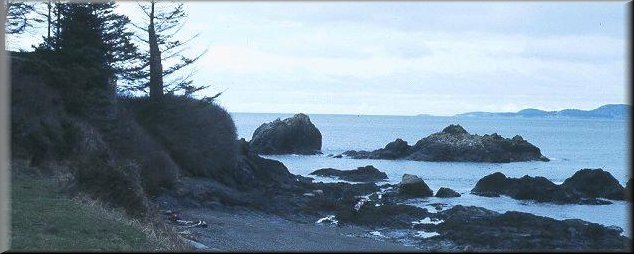
 |
Not far from the town of Anacortes is a wonderful beach and park called Rosario Beach. There you can look south across a straight of water to the north shore of Whidbey Island. Separating Whidbey from the mainland is a very narrow channel called Deception Pass because there the currents are very strong and change constantly in direction with the changing of the tides. Rosario Beach lies at the west entrance of the pass, beyond the main tides, but still washed by strong currents.
We had heard tell of an anchor lost some 60-100 ft deep off the beach which we wanted to see. We recognized that we had little chance of ever finding the anchor but out we waded into the water happy and confident in the success of our mission. As we found ourselves deeper and deeper we noticed two things, the obvious dimness of our world, and the increasingly sparse life. We soon decided that no anchor was worth the waste of air in our tanks and we moved up the more interesting territory. The currents, while taking us a long way from our starting point, was our friend since we were able to just relax in a vertical position and let the current sweep us past the bottom. Our feet were up in the "air" and our heads just above the bottom it the topsy-turvy underwater world. Due to the current, we saw few fish that dive, but mostly anemones, sea pens, kelp forests, and other plants attached to the bottom. The kelp was the most interesting, dense underwater forests swaying in the current.
There were no major incidents on that dive, no crabs to bring home for supper, just a long swim back the way the current had carried us. The return was not difficult. Even though out of air by then, we moved into the shallows and snorkeled in and out of the flooded tide pools along the coast. At one moment we spotted a large wolf eel. This animal is fairly dangerous if provoked, and it looked the part, a dull gray-green with a long wide body and small head. Its dorsal fin was laying along the length of its back. At one moment I touched it with the flat of my diving knife and it flared its fin along the whole length. We decided to leave well enough and continued our return. Leaving the sea is always an interesting moment. It is only then that we could talk about what we had seen and done. While removing our gear, hauling it back to the cars, we always made up for our enforced silence. That day we returned to our own world well satisfied with our visit.